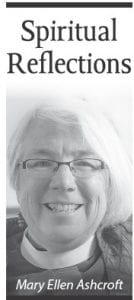When I lived in South Africa from 1974 to 1982, it was a scary place to be. Waves of people (usually white professionals) emigrated to safer places like England. Many moved back. Asked why they would go through the huge hassle and expense of packing up their worldly goods and moving to another continent, and then moving back, they responded, “There’s something about this place. About South Africa…rugged cliffs, desolate beaches, plants and animals….I don’t know…I couldn’t live in England’s green and pleasant land…”
In essence they were saying, “It’s not easy to live here, but I’d rather live in this particular place, this beautiful, wild landscape— than somewhere safer and easier…”
As I planned my sabbatical I considered parallels between South Africa and the north shore and this idea of wildness stood out. For many/most/ all of us, it’s not always easy to live here—[your example here]—but for some deep, almost inexplicable reason— we think it’s worth it.
What is it, I asked in South Africa, and ask now— what is it about wilderness? Sigurd Olsen wrote about our need for these wild places and pushed for them to be set aside in The Wilderness Act—places where people are visitors, not residents.
Is there something about wild landscape that puts its roots down into our hearts, like those roots we see winding over rocks in the woods?
Maybe we need wild places to refine us, like the children of Israel’s wanderings in the wilderness, or Jesus as he was “led by the Spirit into the wilderness to be tempted…” There’s a sifting, a clarity on a muddy trail or a lonely beach.
Or do we sense something about God in glittering dew on tamarack needles or moonlight on snow? Is there a reality in the brittle cold of January or November gales that teaches us what we couldn’t learn in other ways?
From earliest days, those seeking God have been counseled to look around them at the created order. The Psalmist models this: “When I consider the works of your hands, the moon and the stars which you created, I think….” The reformers spoke about God’s two books—the Bible and Creation.
What do we learn from the created order around us? Seasonality, rhythms….My 3½-year-old grandson asked how trees grew, and I pointed out a stump with baby trees sprouting amongst the moss. As he peered closely, I told him how the old tree’s core provides safe nurture for baby ones. There, I thought: that’s what we must do for our own young and vulnerable.
People are pulled to the north shore by their longing for rugged places. Almost anywhere you go, if you say you live in Grand Marais, the response is, “Oh, I love Grand Marais.” People love the idea of a place so beautiful and wild, a small town with artsy people, where it is so easy to get into the woods.
And yet, in a way that seems to reverberate throughout our society today, visitors sometimes have trouble being here: Where can I get internet access? Why doesn’t my cell phone work? Where is the nearest Starbucks?
Similarly on my sabbatical I met people who had traveled to South Africa for the beauty, remoteness and authenticity of the place, but often stayed in their coaches, hotels and groups— essentially protecting themselves from what they were seeking. They took pictures, many pictures, to show they’d been there or that they’d seen a particular animal.
How can the spirituality of wild places enrich our lives? And how can we share this value with those who visit here, seeking? Here are some thoughts I’m chewing on: . We can be grateful to live here, and expect to find God as we are out in nature, open to learning things we couldn’t learn elsewhere. . There is great value in helping people experience God’s good creation. Good work—you outfitters, you who feed the smelly people who have come out of the woods, you rangers who keep wilderness wild, you who clean up trails, you who write guide books, etc.
In the Anglican tradition, the gospel is often lifted high and carried to the center of the congregation to be read. This valuing, this lifting up of the gospel could be applied to the created order. How do we hold the creation around us, God’s other book, up as holy and to be treated with reverence and awe? . In an era in which many people express their hunger for God, not in wanting to be part of a church but in wanting to be in wild places, we need, I believe, to affirm the goodness of this longing. As the apostle Paul said to the Athenians (and I paraphrase): “Great job, guys, longing for good stuff…..let me tell you more….” That “more” is a faith community where other needs are met—community support, sacramental mystery, broader challenge, a platform for outreach. But hunger for the wild is a good, God-given longing, a fine first step.
Finally, we need to take time to appreciate this wild world around us. When I was first a Christian, we sang a song that ran: “This world is not my home, I’m just a-passin’ through; My treasures are laid up, somewhere beyond the blue.” Nothing could be further from the truth (and the attitude expressed in this hymn explains conservative religion’s slowness in working for environmental stewardship). In fact, we have been entrusted with this wondrous world, to love, learn from, and value. In our Episcopal baptism service we pray, “God, give this child the gift of joy and wonder of all your works.”
May we all be given the gift of joy and wonder in God’s works.
Each month a member of the Cook County Ministerium will offer Spiritual Reflections. This month’s contributor is Mary Ellen Ashcroft, Vicar of Spirit of the Wilderness Episcopal Church.



Loading Comments